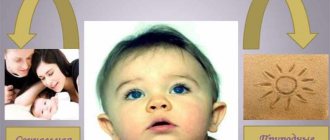The concept of “socialization” consists of many different structures on the basis of which the process of integration into society is built. The task of socialization is to instill in each individual those values and norms of behavior that are approved by society . There are several concepts that are completely opposite to socialization. The names of these phenomena are formed by adding prefixes. These phenomena include “resocialization” and “desocialization.” In this article we propose to talk about what resocialization is and how it manifests itself.
Socialization (lat. socialis - social) is a complex process of including a person in social practice
Detailed analysis of terms
The term “desocialization” is used to describe the phenomenon that consists in the assignment of antisocial norms and values to an individual. This process is the root cause of antisocial behavior and the acquisition of negative attitudes in the behavioral model. Desocialization is one of the factors contributing to destabilization, on the basis of which the deformation of connections with society occurs.
Understanding what desocialization is, it should be said that this process implies a partial or complete loss of social skills. Such problems affect the conduct of life and the process of self-realization of the individual. In such a situation, the person is assigned the “label” of an outcast. According to experts, the reason for the formation of desocialization is associated with the influence of stress factors and problems that arise during the initial immersion in society . It is important to pay attention to the fact that desocialization has a multi-level structure.
Partial desocialization occurs against the background of prolonged isolation from society. Most often, this phenomenon is observed in people who have returned from a long vacation or sick leave. Losing direct contact with other people changes the rhythm of life and makes a person more prone to loneliness. A similar effect is observed in people with Internet addiction, which manifests itself in the form of abuse of computer games and social networks. People with this type of addiction often replace real life with virtual space.
Psychologists note that in this case, the process of desocialization does not have a strong impact on the state of the psyche, which indicates the possibility of correction. Changing your lifestyle and changing your priorities allows you to start the process of resocialization. This phenomenon should be perceived as the independent cultivation in one’s own personality of those qualities that represent paramount values for modern society. The above-mentioned events are an integral part of the formation of the human personality. During the process of growing up, a person changes his worldview, which has a certain impact on his incentives and life itself.
Desocialization is the result of a voluntary renunciation of old values
A severe form of desocialization is observed in children raised in dysfunctional families. An incorrect approach to the educational process can also have a negative impact on the development of personality. The indulgence of parents and the desire to create a barrier from the difficulties of life significantly increases the risk of various problems arising during immersion in society. A person raised in greenhouse conditions does not readily assimilate the norms of the social groups surrounding the individual. Against this background, various problems associated with performing the simplest actions are observed, among which the construction of communication connections should be highlighted.
Resocialization of adolescents is a complex process, the success of which depends on many different factors.
Belonging to criminal groups or subcultures can instill false values that are directly opposed to the norms of cultural society. Such circumstances can become unfavorable ground for personal development.
Violations in the sphere of socialization can be caused by factors such as:
- loss of a close relative;
- job loss;
- personality and mental disorders;
- Act of terrorism.
Stressors can have a profound impact on a person's personality, which can lead to changes in lifestyle. Under the influence of stress, a person can greatly narrow his social circle, isolate himself from society and lose the skills of building communication connections.
There are voluntary types of renunciation of social norms and values. One example of voluntary desocialization is entering a monastery. It is important to note that the rejection of generally accepted rules in favor of spiritual enrichment allows the human person to constantly improve himself. The uniqueness of this example lies in the simultaneous occurrence of the processes of desocialization and resocialization.
Disadaptation in children
The maladaptation of children in modern society is of particular importance. More and more children in developed and developing countries suffer from a variety of behavioral and mental disorders. Most of them cannot adapt normally to society and, as they grow and mature, the number of problems only increases. Moreover, according to experts, only a little more than half of these children suffer from neurological diseases and psychopathologies; in others, disruption of social adaptation occurs due to their living conditions, improper upbringing or lack thereof, as well as the influence of parents and the environment.
Social maladjustment of children and adolescents can have an extremely negative impact on their development - such children cannot establish normal contacts with their peers, and then with the people around them, they develop personality deformations, antisocial tendencies, they may develop a neurological disease or they will not be able to achieve any goals. - success in the future.
Timely correction of such disorders in children and adolescents helps them quickly overcome the state of maladjustment and learn all the necessary skills. In adulthood and in older adolescents, this requires much more time and effort - this is due both to less plasticity of the psyche and to the number of “skills” that need to be replenished.
This has been repeatedly confirmed by numerous studies and practical activities - children at an early age who were in a state of social maladaptation easily and quickly catch up and even outstrip their peers in development when placed in favorable conditions. But for adults who grew up in a state of maladjustment, it is much more difficult to assimilate the necessary information and “join” a more complex society.
How does the desocialization process work?
Many researchers in the field of psychology are interested in the question of the reasons for choosing antisocial behavior. According to experts, the choice of an antisocial model is carried out unconsciously. Many children, adopting the behavior of others, do not think about its direction. It is important to note that receiving approval from representatives of a negative social microclimate leads to an increase in the manifestation of antisociality. In the minds of many teenagers, a clear attitude is created that such behavior is inherent in every adult.
Social control makes it possible to prevent such unfavorable development. In the case when a teenager has embarked on the path of correction, it is very important that he feels support and attention to his difficulties. It should be understood that in a dysfunctional environment, values such as kindness and hard work are relegated to the background.
What is personal desocialization and why is this issue of particular importance? According to psychologists, this process has a spontaneous course. Quite often, criminal elements deliberately cause desocialization in adolescents in order to involve them in criminal activities. This process is based on the technique of reward and punishment.
Resocialization means a change in a previously socialized person, a rejection of previous attitudes and ideas.
A person following an antisocial path needs strict control aimed at resocialization. Various municipal services can act as a supervisory authority. The term "resocialization" is used to refer to the process of changing behavior, which is exactly the opposite of the previous one. In a specific example, the prefix “re-” is used to denote the dismantling of negative norms and rules that were previously used by the individual. Throughout the entire process of resocialization, a person is engaged in self-improvement and discovers in himself those qualities that cause public approval.
Correction path
Resocialization is applied to an individual who has taken an antisocial path of behavior by various state institutions of social control. This concept means a certain type of change that occurs in a person, which allows him to adopt a type of behavior that is radically different from the previous one. In this case, the prefix “re-” means the destruction and dismantling of negative values and norms that have been internalized by the individual. During this process, a person accepts those positive concepts that are approved by society.
Use of the term
The term “resocialization” is widely used in various fields of human activity, including social psychology, sociology, pedagogy and jurisprudence. This concept is closely related to the measures that are used in society in relation to people leading a criminal lifestyle.
Pedagogy uses resocialization as a tool through which new life values are instilled in a person, which can replace those previously learned. The focus of this process is carried out in relation to people whose behavior patterns differ significantly from generally accepted rules. The main goal of such a tool is to restore lost status and change negative attitudes . In order to achieve the necessary result, the person being corrected must be immersed in a prosperous environment.
Resocialization of convicts is a term that is widely used in jurisprudence. Most often, this concept is used when resolving issues related to penal policy. This tool is used only for young people, since representatives of this age group are more susceptible to resocialization. In this example, resocialization is not the process of instilling generally accepted norms and rules, but the end result.
Socialization goes through stages that coincide with the so-called life cycles
The urgency of the task
The topic of resocialization is associated not only with those who have committed criminal acts. It also applies to other categories of people. Thus, the resocialization of drug addicts, the unhealthy, and those who have experienced stress during natural disasters, military operations or accidents is of great importance for society.
Such people need not only social assistance. To carry out the usual process of resocialization, psychotherapy and psychocorrection (auto-training, etc.) will be useful. Social adaptation of such people should not be expected unless the sensory tension of the individual is relieved.
Who is responsible for resocialization
Resocialization is a series of social control measures aimed at correcting an individual with an antisocial behavior pattern. Such control is carried out by educational and military groups, schools, institutes and public organizations. Representatives of law enforcement agencies, who act as preventive structures, have special power in this matter. It is important to note that in most cases, resocialization implies the absence of measures depriving freedom. However, in the event of criminal acts committed against an individual, various sanctions may be taken.
In some cases, violation of generally accepted norms and rules can lead to long-term imprisonment. Considering the above factors, we can say that resocialization is an important tool that allows individuals to return their former social skills. Throughout this process, various methods are used to help eliminate antisocial behavior and reinforce positive attitudes. The following organizations can act as regulatory bodies carrying out resocialization:
- educational and labor prisons for juvenile offenders;
- correctional labor institutions;
- rehabilitation centers for drug addicts and alcoholics.
The task of such institutions is to correct people who have taken the wrong path in life.
Relevance of the issue
The topic of resocialization is closely interconnected not only with criminal actions. A similar process is carried out in relation to people from other categories . An important role in the development of modern society is given to the process of resocialization of people with addiction, personality disorders and mental illnesses, as well as in relation to people under severe stress due to natural disasters, terrorist attacks or road accidents.
Desocialization and resocialization are two sides of the same process: adult, or continued, socialization
People in the above categories need more than just social support. An important component in the process of resocialization is psychotherapy, auto-training and psychotherapeutic correction. In order to speed up adaptation in society, emotional stress should be eliminated.
Vivid examples of resocialization are demonstrated by such municipal services as the Church, the Salvation Army and charitable public organizations. However, such municipal services operate only in foreign countries. On the territory of the Russian Federation, specialized centers are engaged in social rehabilitation. Today, the issue of developing such centers is highly relevant, since the percentage of people in need of help is only increasing every year. Every person throughout his life is faced with the need for social adaptation . In order to achieve the desired result in this process, it is very important to relieve psychological stress and eliminate internal conflicts.
Causes of maladjustment
Desocialization or mental maladaptation can occur due to psychological, physical or social reasons. The most significant today are considered to be social and socio-economic reasons, and disturbances in the functioning of the nervous system and mental characteristics can be corrected by proper upbringing and development, but failure to comply with the rules of upbringing in society can lead to problems with social adaptation even with full physical and mental health.
Social psychological disadaptation occurs when:
- Physical or biological disorders - brain injuries, diseases of the nervous system, infectious diseases that occur with high fever and intoxication.
- Psychological disorders - features of the nervous system (weakness, excessive excitement, disturbance of volitional processes), character accentuations, and so on.
- Social disorders - this factor is especially significant in childhood and adolescence. Improper upbringing and rejection of a child or adolescent by a family or team can lead to maladaptation and the development of serious mental disorders. Adults may also suffer from socio-psychological maladjustment if they find themselves in an unfamiliar and hostile environment, a situation of general rejection or trauma (for example, a mentally healthy, fully adapted adult placed in prison or an antisocial community).
Desocialization in childhood and adolescence can also be caused by some other factors, for example, keeping a child for a long time without parents or impaired communication at school.
Hospitalism in children is a pathological syndrome that develops in children who have been in a hospital or boarding school for a long time, forcibly separated from their parents and their usual social circle. A lack of communication leads to delays in physical and mental development, the formation of emotional disorders and social maladjustment. Such disorders arise due to the lack of sufficient attention from adults, as well as a lack of positive and negative stimuli from society. In such conditions, a child is left to his own devices and cannot fully develop.
Hospitalism syndrome in children develops not only when placed in a hospital, but also during a long stay in a boarding school, orphanage and other places where the child is deprived of his usual social circle.
Adolescents are more likely to experience school maladjustment. Desocialization develops when a student is “different” from other peers, and the reason for “expulsion from society” can be any distinctive feature: low or high academic performance, external data, individual traits, or something else. School maladaptation often occurs when a child’s familiar environment changes, a sudden change in his appearance or social factor, sometimes for no apparent reason. Rejection, ridicule from peers and lack of support from teachers and adults lead to a disruption in the establishment of social connections and loss of one’s place in society.
In addition to the above reasons, desocialization can occur due to nervous and mental disorders in children and adults:
- autism
- Schizophrenia
- Bipolar personality disorder
- Obsessive-compulsive disorder and so on.











